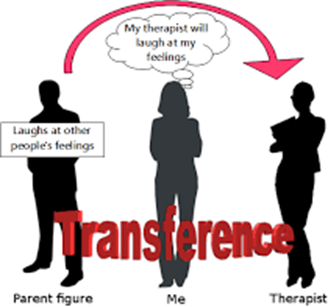As the nurse begins to discuss discharge plans for a 45-year-old female client hospitalized for anxiety, the client states, "You never really cared whether I get better! Why not stop this charade?" The nurse recognizes this to be:
Insecurity
Transference
Countertransference
Secondary gain
The Correct Answer is B
Choice A rationale: this is inaccurate since it does not display insecurity where feelings of inadequacy or uncertainty are displayed affecting the individual’s self-esteem and confidence.
Choice B rationale: transference is a defense mechanism where the patient unconsciously transfers their feelings, expectations, and attitudes from their previous relationship to a current relationship. In this case, the client is projecting her unresolved feelings about someone who did not care for her onto the nurse, who is trying to help her.
Choice C rationale: Countertransference is the process where the nurse unconsciously transfers their unresolved feelings and attitudes from a past relationship to their clients.
Choice D rationale: secondary gain is the benefit received by an individual for being sick, for instance, attention and sympathy. The client’s statement is an indication of rejection of the nurse’s help rather than seeking a secondary gain.

Nursing Test Bank
Naxlex Comprehensive Predictor Exams
Related Questions
Correct Answer is B
Explanation
Choice A rationale: this is incorrect since it is not sufficient by itself to warrant an inpatient admission hence the client can be managed as an outpatient.
Choice B rationale: this is one of the criteria for inpatient admission to a mental health facility since with the inability to cope with life stressors or control his behaviors the patient is at risk of harming either themselves or others. Moreover, this criterion reflects the principle of beneficence, meaning that the best is being done for the client's well-being and safety.
Choice C rationale: this is incorrect since depression is not sufficient by itself to warrant an inpatient admission hence the client can be managed as an outpatient.
Choice D rationale: this is incorrect since it is not sufficient by itself to warrant an inpatient admission hence the client can be managed as an outpatient.
Correct Answer is ["0.4"]
Explanation
To answer the above question we will use the formula:
Dose (ml)= ordered dose (mg)/ Concentration (mg/ml)
= 2mg/5mg/ml
= 0.4 ml
Whether you are a student looking to ace your exams or a practicing nurse seeking to enhance your expertise , our nursing education contents will empower you with the confidence and competence to make a difference in the lives of patients and become a respected leader in the healthcare field.
Visit Naxlex, invest in your future and unlock endless possibilities with our unparalleled nursing education contents today
Report Wrong Answer on the Current Question
Do you disagree with the answer? If yes, what is your expected answer? Explain.
Kindly be descriptive with the issue you are facing.
